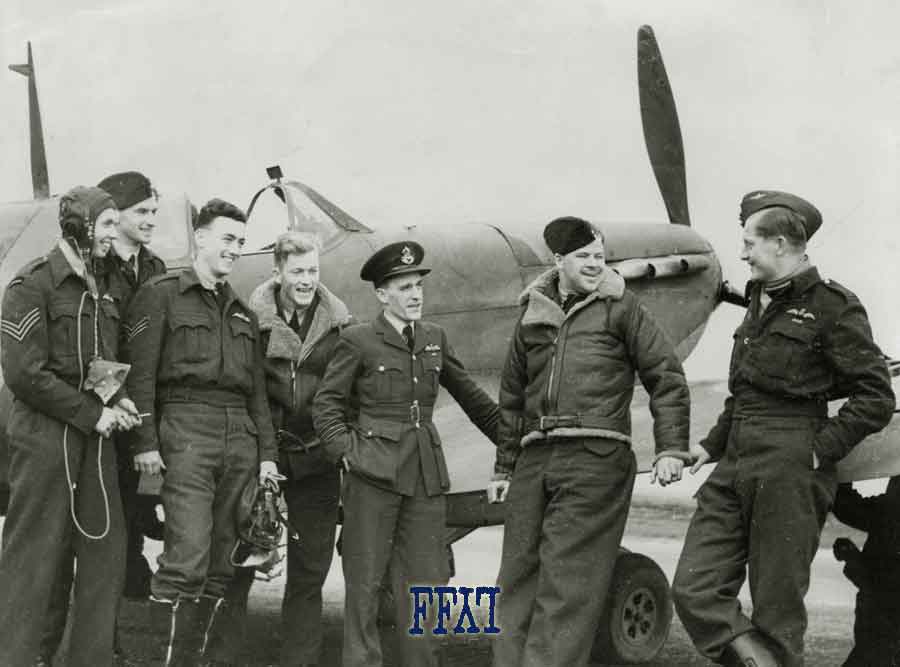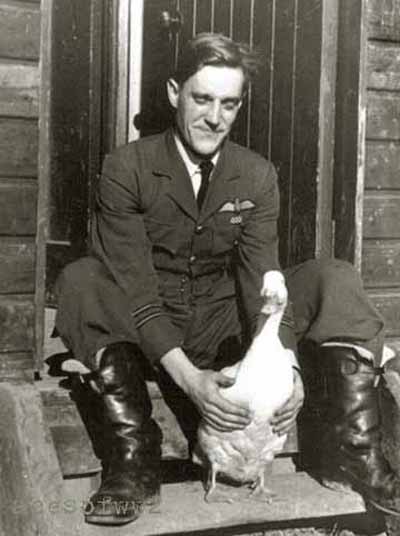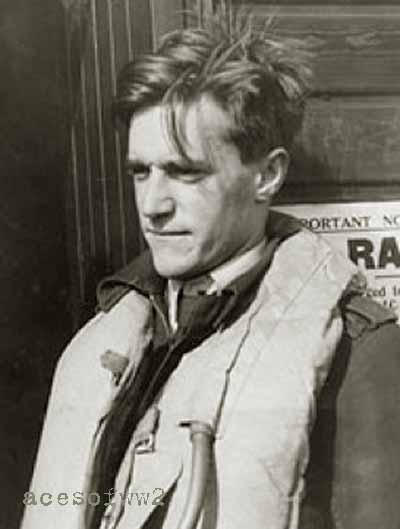|
|||||||||
_________________________________________________
BARTON, F/L Robert Alexander (37664) - Distinguished Flying Cross
Awarded as per London Gazette dated 22 October 1940.
This officer has displayed outstanding leadership. His skill was particularly displayed on September 28 (27th -HH), when his squadron destroyed twenty enemy aircraft. Flight Lieutenant Barton has destroyed four enemy machines and shared in the destruction of others.
_________________________________________________
Canadian Aces Win D.F.C. Bars For R.A.F. Jobs in Middle East
London, 30 October 1941 — (CP Cable) — Squadron Leaders Andrew William Fletcher of Lethbridge, Alberta and Robert Alexander Barton of Kamloops, B. C., two Canadian aces in the RAF Mediterranean Service, have been awarded bars to their Distinguished Flying Crosses, it was announced tonight.
(This dispatch was the first public word that the two Canadian aviators had been promoted to the rank of squadron leader. One year ago it was announced they had been awarded the DFC, Fletcher's coming on October 21, 1940 and Barton's on October 17, 1940. Fletcher's father lives at Lethbridge and Barton's father at Penticton, B.C.)
Tonight's announcement said Fletcher led a detachment of Beaufighters which is credited with destroying or damaging, in a 15-day period, a total of 91 enemy aircraft. In the words of the official citation, the squadron's relentless action crippled enemy air activity and prevented any strong attack against convoys.
Barton, 25-year-old airman who had destroyed seven enemy aircraft over the United Kingdom when he won the DFC a year ago, has accounted for four during service at Malta and his personal total now stands at 11.
The citations paid tribute to the courage and leadership of both men.
Fletcher, who is 26, commanded No. 272 Squadron while posted at Malta. He specialized in the navigation of reconnaissance craft and flying boats. His citation said:
"From July 21 to August 3 (1941), this officer commanded a detachment of Beaufighters operating from Malta with a role of assisting in the safe passage of convoys sailing between Gibraltar and Malta. Attacks were made on certain airdromes and seaplane bases which resulted in the loss to the enemy of 49 aircraft destroyed and a further 42 damaged.
"The successes achieved undoubtedly crippled the enemy's air activity so seriously that he was unable to carry out effective reconnaissance and to launch a strong striking force against convoys. Throughout, S/L Fletcher displayed courageous leadership and determination and set an example which proved an inspiration to all."
Barton's citation:
"This officer destroyed seven hostile aircraft during his period of service in the united Kingdom. Since his arrival at Malta, he has led his squadron on all interceptions and fighter patrols during which he has destroyed four hostile aircraft including one at night.
"S/L Barton has throughout shown a high standard of courage, leadership and initiative, and contributed materially to the results obtained by the fighter effort on the island."
A note accompanying the official announcement of his award said Barton's "outstanding leadership has contributed materially to the many successes obtained by his squadron" and added "his skill was particularly displayed on one occasion when his squadron destroyed 20 enemy aircraft."
_________________________________________________
BARTON, S/L Robert Alexander, DFC (37664) - Bar to Distinguished Flying Cross - No.249 Squadron
Awarded as per London Gazette dated 31 October 1941
No citation other than "for gallantry and devotion to duty in the execution of air operations." Public Records Office Air 2/4782 (Non-Immediate Awards, Middle East, 1941-1943) has following recommendation communicated by RAFHQ Middle East to Air Ministry Honours and Awards Committee, 2 October 1941:
Squadron Leader Barton is Officer Commanding No.249 Squadron. During his period of service in the United Kingdom this officer shot down seven and one-half enemy aircraft confirmed and since his arrival in Malta has show down four and one-half enemy aircraft including one enemy bomber at night. He shows a high standard of courage and initiative and his excellent leadership has been a tonic to his flight commanders and fellow pilots and to the station in general. He leads his squadron on all interceptions and offensive fighter patrols which entails being on "Standby" every other day. In addition to this he performs night fighter duties which on many occasions have entailed being on watch for the entire 24 hours without a break. The results obtained by the fighter effort on the island of Malta can be largely credited to the efforts of this officer in the manner in which he inspires the pilots under his command.
This was edited down for the Honours and Awards Committee at Air Ministry:
This officer destroyed seven hostile aircraft during a period of service in the United Kingdom. Since his arrival in Malta he has led his squadron on all interceptions and fighter patrols during which he has destroyed four hostile aircraft, including one at night. Squadron Leader Barton has, throughout, shown a high standard of courage, leadership and initiative and has contributed materially to the results obtained by the fighter effort on the island.
_________________________________________________

No.58 OTU - J. Hawkey, P/O Porteous, Reg Gray, Barnes, W/C Barton, W. Clymer, F/O Beasley (Gray collection)
Airmen Who Met Huns During Battle of Britain Paved Way For Offensive
Some of Canada's First Aces of This War Still Are in Action - Pilots Now Seek Out Enemy Over His Own Territory
(Written for the Canadian Press by F/L Basil Dean, R.C.A.F.)
Fighter Command, Somewhere in England, Sept. 8, 1943 — (CP) — There are still some of the few left, some of those hard-fighting combat pilots of Battle of Britain days, but mostly it is a new brood of pilots who fly from the air bases hereabouts in Britain's Fighter Command. Three years ago, when the first few of Canada's aerial aces were fighting their way to fame, the battles were over British soil. Now, with greater numbers of Canadians than ever before in Fighter Command, the pilots are going out to seek the enemy over his own territory. This air fighting of today is offensive, not defensive, as during the Battle of Britain, but it was the fighting then that made the current offensive possible.
Some Still Flying
Some of the Canadians who fought with honor and glory in those grim days three years ago are still flying. W/C D. B. Russel, D.F.C., of Montreal, who now leads an R.C.A.F. Spitfire wing in Britain, was then P/O Dal Russel and a member of Canada's No. 1 Fighter Squadron, which arrived in England in June, 1940 — just in time to get trained for the fierce tests of August and September of that year.
Russel's old commanding officer, Ernie McNab, now is Group Capt. Ernest McNab, D.F.C., of Regina, commander of an R.C.A.F. fighter station.
In Sicily, S/L Stanley Turner, D.F.C. and Bar, of Toronto, led the R.C.A.F.'s City of Windsor fighter squadron through the island campaign. In 1940, he was a flight commander in the R.A.F.’s famed "all-Canadian" squadron led by Wing-Cmdr. Douglas Bader, D.S.O., D.F.C., which destroyed 63 enemy aircraft during the Battle of Britain and shared three with other squadrons.
The squadron was composed mainly of Canadians who had joined the R.A.F. before the war, and fought nobly during the Battle of France and over Dunkerque.
Most Efficient
Its achievements during the Battle of Britain, indeed, brought from the air officer commanding of the group in which it was serving at the time a message which said that its efficiency as a squadron was "equal, if not superior, to any squadron in the R.A.F." The British chief of air staff signaled: "You are well on top of the enemy and obviously the fine Canadian traditions of the last war are safe in your hands."
Greatest pilot of the "all-Canadian" squadron — apart from the legless commander, Bader (who was not Canadian) — was P/O W. L. McKnight, D.F.C. and bar, of Calgary, who was reported missing some months after the Battle of Britain ended. McKnight destroyed 16½ enemy aircraft, and was the first (2nd -ed) Canadian ace of the war.
The "all-Canadian" squadron's first Battle of Britain engagement was August 30, when Bader, now a prisoner of war, led a formation of 14 Hurricanes against a "vast number" of German aircraft, two swarms of 70 to 100 each. Detaching one section to investigate a third formation of aircraft some distance away, Bader led the rest of his pilots to the attack. As a result, 12 enemy aircraft were destroyed; not one of the Hurricanes had so much a scratch.
Similar engagements followed. On September 7, Bader and his Canadians destroyed 10 enemy aircraft without losing a pilot, although seven of the squadron's Hurricanes were damaged. On September 19, when the wing in which the squadron was flying destroyed a total of 18 enemy aircraft, the "all-Canadians" were credited with 11 of these for the loss of one pilot killed.
And then, in the greatest day's fighting of all on September 15, the squadron destroyed 12 enemy aircraft. This was the day on which Bader described the fighting as "the finest shamble I've ever been in."
"The sky," he added, "was full of Hurricanes and. Spitfires, queuing up and pushing each other out of the way to get at the Dorniers. I was seldom able to hold my sights on a target for long for fear of colliding with other Spitfires and Hurricanes anxious to get in a burst."
Among the Canadians P/O J. B. Latta, D.F.C., Victoria, B.C., had knocked down five enemy planes; F/L Turner had five; so had P/O N. K. Stansfeld, D.F.C., Vancouver. P/O H. N. Tamblyn, D.F.C., North Battleford, Sask., and P/O N. Hart had four each. Altogether Canadian pilots in the squadron had destroyed 45 of the total of 65 credited to the squadron; Bader had scored 11.
Canada's own No. 1 fighter squadron, which although its personnel have completely changed; is still flying in Britain with fighter command, had scored a total of 31 victories during the battle under McNab's leadership. McNab himself had scored the first victory to be credited to a member of the squadron when, in order to gain combat experience, he flew as a supernumerary officer with an R.A.F. squadron before No. 1 fighter was ready for front-line duties.
In the squadron's first engagement as a unit, on August 24, it destroyed three Dorniers for the loss of one pilot. By the end of its first week in action it had destroyed eight enemy aircraft for the loss of one pilot killed. The score continued to mount until September 27, when the Canadian squadron destroyed seven enemy aircraft out of about 70 engaged during the day; one pilot of the squadron was killed. In the day's first fight, Russel had destroyed an ME 109 and an ME 110 and had shared with a Polish pilot the destruction of a third enemy fighter.
McNab, F/L G. R. McGregor and Russel were each awarded the D.F.C., having destroyed between them, 11½ of the squadron's total. McNab and McGregor now are both group captains; Russel is a wing commander.
In other squadrons of the R.A.F., Canadians had also distinguished themselves. One of the flight commanders in the R.A.F. squadron was a Canadian, F/L R. A. Barton, Kamloops, B.C., who later became squadron commander of his unit. He was awarded the D.F.C. for his "outstanding leadership" on September 27, a day on which the squadron destroyed 21 enemy aircraft for the loss of two pilots killed. The total bag during September was 48, a total exceeded only by the famous No. 303 Polish squadron, in which another Canadian, F/L (now Wing-Cmdr.) John Kent, Winnipeg, was at that time a flight commander.
_________________________________________________
Air Ministry, 1st January, 1945.
The KING has been graciously pleased to give orders for the publication of the names of the following personnel who have been Mentioned in Despatches:
Wing Commanders
R. A. BARTON, D.F.C. (37664), R.A.F.O.
_________________________________________________
BARTON, W/C Robert Alexander, DFC (37664) - Officer,
Order of the British Empire
Awarded as per London Gazette dated 14 June 1945
CENTRAL CHANCERY OF THE ORDERS OF KNIGHTHOOD
St. James's Palace, S.W.I, 14th June, 1945
The KING has been graciously pleased, on the occasion of the Celebration of His Majesty's Birthday, to give orders for the following promotions in, and appointments to, the Most Excellent Order of the British Empire: —
To be Additional Officers of the Military Division of the said Most Excellent Order:
Wing Commander Robert Alexander BARTON, D.F.C. (37664), Reserve of Air Force Officers
Public Record Officer Air 2/9056 (courtesy of Steve Brew) has citation:
This officer has been in command of the station since August 1943. During this period he has run the station extremely well. His personal example has been outstanding and he has worked hard in improving the operational efficiency, skill and airmanship of the very large number of pilots in the various squadrons which have been stationed at Skeabrae. He has, on a number of occasions, participated in operational sorties both by day and by night, under extremely adverse weather conditions. His efforts to reduce the aircraft accident rate have been outstanding.
_________________________________________________
It's interesting to note that the Bar to his DFC is not mentioned in any subsequent award
_________________________________________________
Victories Include:
14.5 / 2 / 6 or 12 / 3.5 / 6
Score from Aces High 2nd Ed. & Aces High vol. 2 |
 Buddies - Butch & Howard |
_________________________________________________
_________________________________________________
Thanks go out to
On these pages I use Hugh Halliday's extensive research which includes info from numerous sources; newspaper articles via the Canadian Museum of Civilization Corporation (CMCC); the Google News Archives; the London Gazette Archives and other sources both published and private.
|
Some content on this site is probably the property of acesofww2.com unless otherwise noted.
![]()

